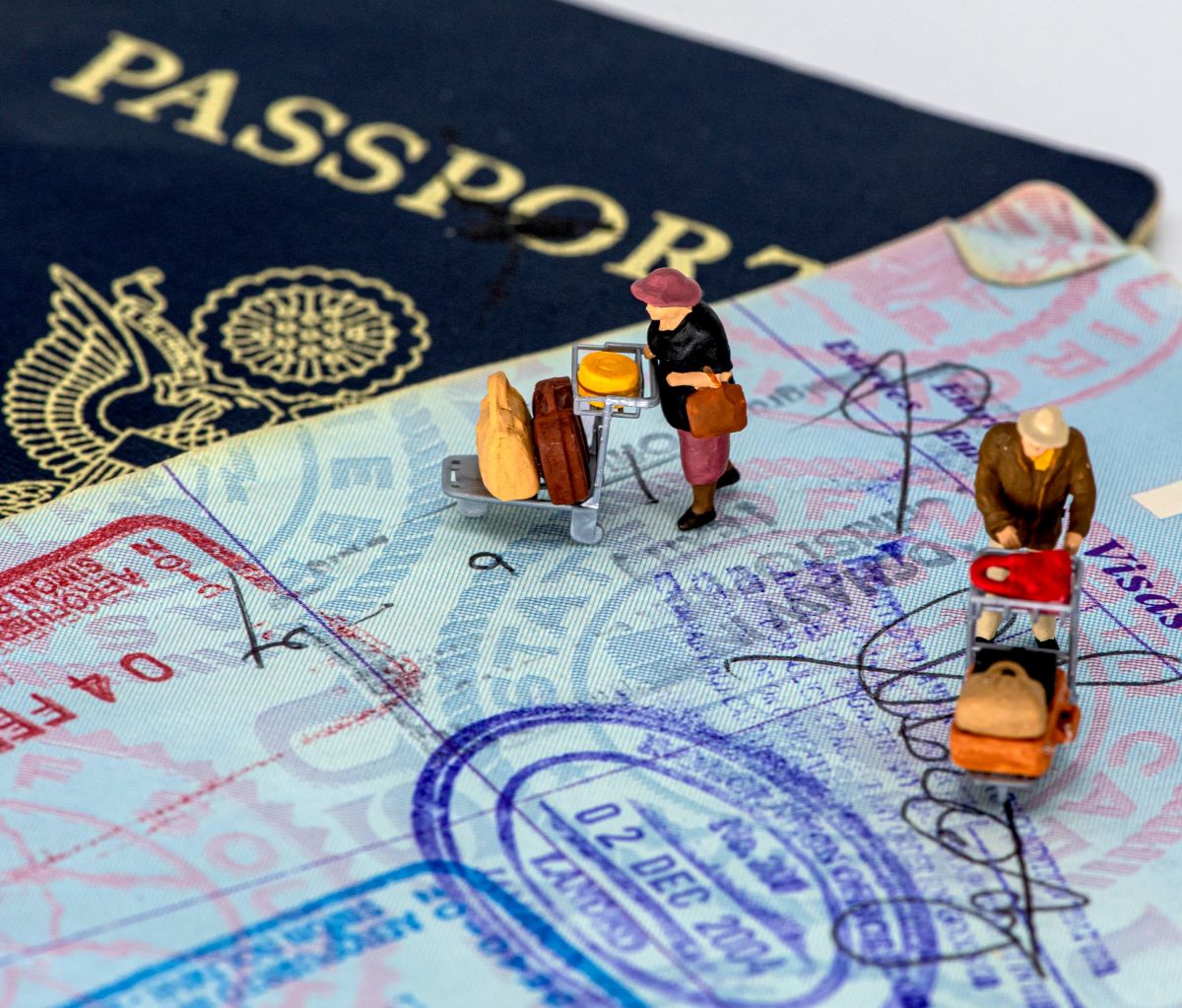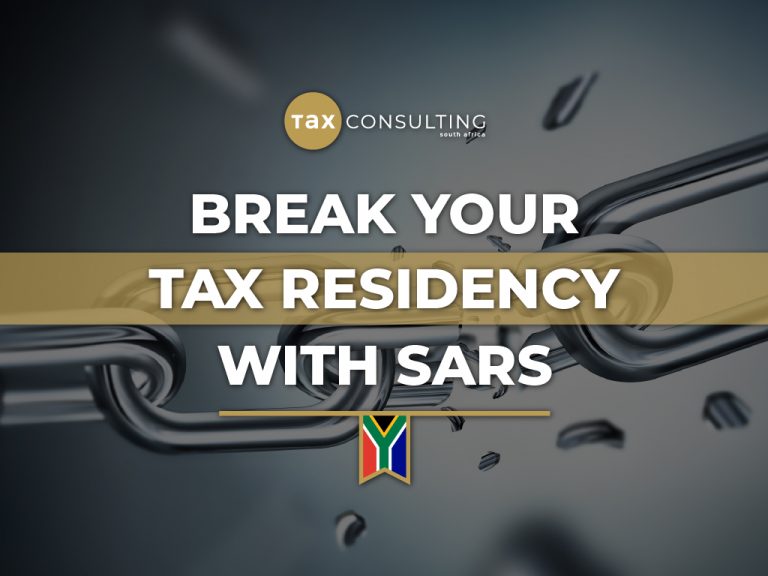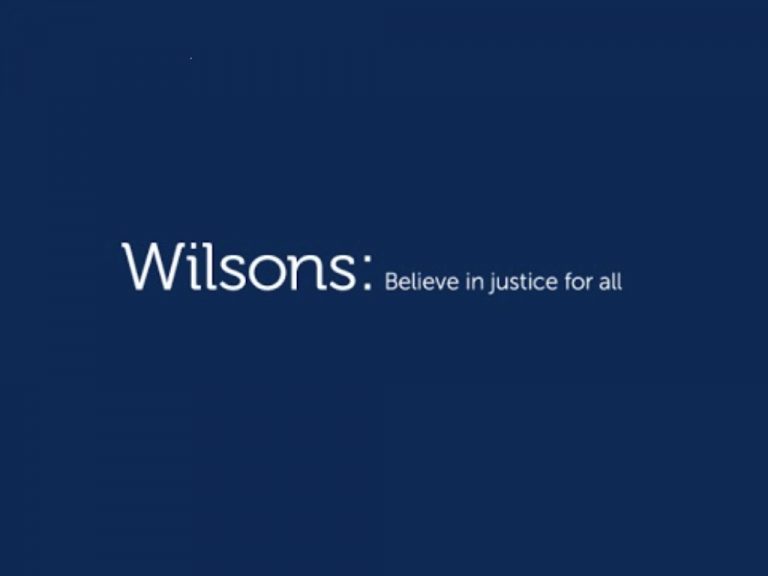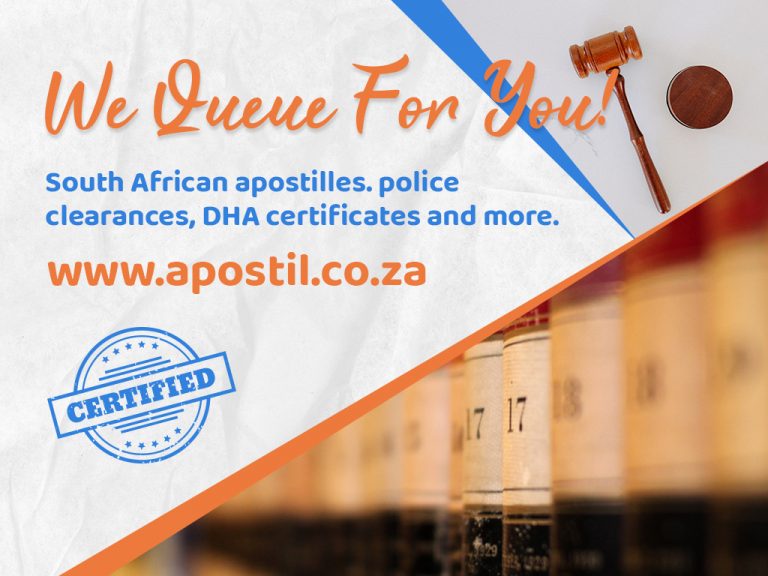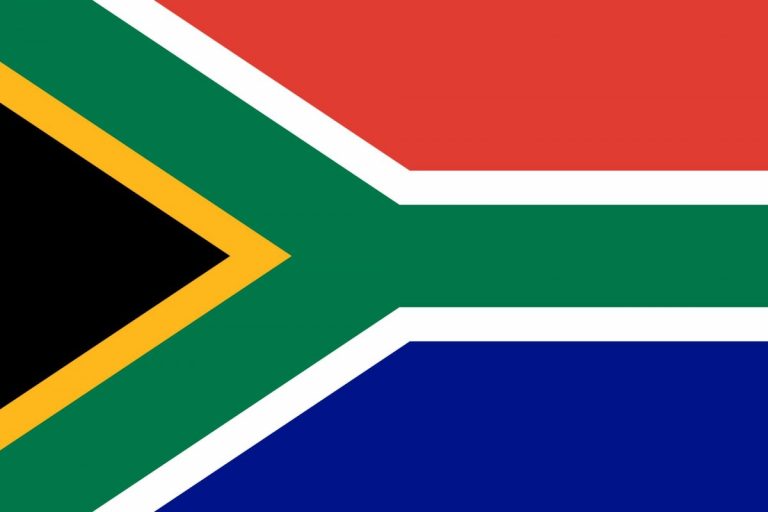We have many questions asked on our Facebook group with regards to document and abbreviations, so this page has been created to help with explanations of some of the different documents that you may require when immigrating to the United Kingdom from South Africa, and also some documents you may require at some point when settled and living in the United Kingdom.

Many South Africans abroad, or still in SA, require various types of documentation for a number of means, be it travel, investment, visa and immigration, and much more.
Apostil.co.za handles every kind of document you can imagine – we queue and apply for you, then courier the document to you after obtaining it on your behalf.
- Apostille Certificate
- Authentication and Attestation
- South African Police Clearance Certificates
- Unabridged Birth Certificate
- Unabridged Marriage Certificate
- Marriage registration Surname Changes
- Unabridged Death Certificate
- Divorce Decree
- Letter of No Impediment
- Drivers Licence Verification Letters
- SA Citizenship Determination and Renunciation
Documents
Many South Africans abroad require official documents for many different reasons. Some of the reasons are to apply for visas, residency, employment, or other immigration-related reasons.
Obtaining documents from abroad can be quite a struggle if you are not equipped with the right information, knowledge, and tools.
In this section, we cover some of the most important and most asked questions regarding the process of obtaining documents from abroad.
Apostille Certificate
If you are wondering what an apostille certificate really is, it is the name for a specialised certificate that verifies ONLY the stamp and signature on official documents. This certificate is attached to an original document in order to verify the legitimacy and authenticity of the stamp and signature on the document, so that it can be accepted and used in member countries of The Hague Apostille Convention (not quite the correct name, but we’ll get there later).
Knowing your way around the legalisation of official documents is imperative for success if you want to move or travel abroad and submit approved visa and immigration applications. In most cases, you will need to have your documents apostilled or authenticated (grouped under the term legalisation) for official use abroad. And more often than not, this calls for the apostille process. But what exactly is an apostille and how can you obtain one?
If a country is not a signatory of the Apostille Convention, then the document can still be legalised for that country by being “authenticated”, not apostillised. The authentication process is multi-tiered, but it is still performed by the same governing bodies responsible for the apostille process. An authentication certificate looks slightly different from an apostille certificate.
Usually, it must be attested thereafter at that country’s embassy based in South Africa.
Authentication and Attestation
South African Government Issued Documents and Private Documents, to be accepted by Foreign Governments and Companies must be Authenticated or Legalized, the process of validating the authenticity of the Document and its Signatory. Documents that need to be Apostilled or Notarized, must be valid, for example, a SAPS Police Clearance certificate may not be older than 6 months at the time of Apostille/ Notarization.
An Apostille Certificate will be attached to your document/s, where the intended country for usage is a part of the Hague Convention. In this case, your document/s will not be Notarised by the embassy.
Where the intended country is not part of the Hague Convention, a Certificate of Authentication will be attached to your document/s. Your document/s must then be presented to the relevant embassy for final Attestation.
Both, Apostille and Certificate of Authentication are issued by The Department of International Relations and Cooperation (The DIRCO).
Some Of the Documents That May Fall Within The Legalization Process:
- South African Police Clearance Certificates
- Higher Education Qualifications
- Unabridged Birth and Marriage Certificates
- Medical Reports
- TEFL/TESOL Certificates
- Divorce Order Copies
- SANDF Service Certificates
- SANDF Exemption Certificates
Not all documents are the same when following the route of the DIRCO process. Some documents must first be verified by the Governing Body, i.e. Medical Reports – Health Professions Council of South Africa, University Degrees – South African Qualifications Authority (SAQA). TEFL/ TESOL certificates must be Notarized by a Notary Public, then presented to the High Court and depending on the destination country, also go through the DIRCO Legalization process.

South African Police Clearance Certificates
A Police Clearance Certificate (PCC or SAPS365) is an official document issued by the Criminal Records Centre and Crime Scene Management Centre (CRC & CSMC) stating whether any criminal convictions have been recorded against an individual. The issuing of a Police Clearance Certificate is the sole responsibility of the Criminal Records Centre in Pretoria but can be facilitated by a procurement company. Any South African citizen, or individual who lived or worked in South Africa for a period longer than 6 months, can apply for a clearance certificate. However, this service is mostly available to people who require confirmation of their criminal status for emigration, travel, or employment purposes abroad.
In order to apply for a PCC from abroad, the applicant must submit the following:
- A full set of their fingerprints on an official SAPS Form 91(a) or the official fingerprint enquiry form used in the country where you are applying from.
- A completed SAPS Application form. A certified copy of their ID or Passport
- A certified copy of their marriage certificate if they are married and should their maiden name be required on their clearance certificate.
The usual turnaround time used to be approximately three weeks, from the date of submission at the CRC. This timeline, however, changed due to the COVID-19 pandemic. The CRC closed regularly during the pandemic which created a delay in the processing of clearance certificate applications. Several office closures at the head office of SAPS in Pretoria at the start of 2022 also caused a delay to the processing of already backlogged applications.
There are certain scenarios where applicants require their PCC faster than usual. In such instances, applicants are welcomed to submit an application to expedite their clearance certificate application. The applicant will, however, have to submit a valid written motivation along with proof for their request, to expedite their application.
The CRC accepts no electronic applications. The original application has to be submitted directly to The Criminal Records Centre. However, when using a procurement company, most of the process will be via email or messaging apps.
In the instance where a Police Clearance gets lost or misplaced, you are able to apply for a reprint of your PCC, if your certificate was issued no longer than six months ago. If it has been longer than six months since your certificate was issued, you will have to submit a new application.
When your clearance certificate indicates that there is a criminal record recorded against your name, you have the option of getting your criminal record expunged. However, there are certain requirements which will determine if your record can or cannot be cleared.
Criminal Record Expungements
Yes, you can clear your criminal record from the criminal record database in South Africa. A Criminal Record Expungement is a process of removing a criminal record from your name on the National Criminal Database in terms of the Criminal Procedure Act, Act 51 of 1977.
Applicants may apply for the expungement of a criminal record with the following conditions as set out in the Act:
- The conviction date is older than 10 years at the time of application
- Sentenced to a fine of not exceeding R20 000-00
- Sentenced to imprisonment with the option of a fine not exceeding R20 000-00.
- Corporal punishment
- The sentence was postponed
- You were cautioned and discharged
- Imprisonment wholly suspended
- Correctional supervision in terms of section 276(1)(h) of the Act
- Periodical imprisonment in terms of section 276(1)(i) of the Act.
Unabridged Birth Certificate
Unabridged birth certificates are documents that contain information about a person’s two biological parents or legal guardians. Individuals under the age of 18 years need to provide unabridged birth certificates along with other legal documents (such as passports) when entering or to exit the Republic of South Africa. It was not until after April 2016 that the Department of Home Affairs officially ruled out old birth certificates. Since then, all birth certificates issued are Unabridged Birth Certificates and are referred to as a “Birth Certificate”.
Unabridged birth certificates are mostly required for:
- International travel
- Emigration purposes
- Obtaining visas for certain countries
If you are a minor (under the age of 18), and plan to travel into or out of South Africa, you will need an unabridged birth certificate. You do not need an unabridged birth certificate for domestic travel (for example between Johannesburg and Cape Town), but for international travel, you require this official document.
Often for visas, overseas marriages, and foreign citizenship applications, a South African would require an unabridged birth certificate. The document usually does not lapse or expire, although some jurisdictions and countries do require them to be within a certain validity or age.
Unabridged Marriage Certificate
An unabridged marriage certificate proves that two people are legally married and that they have a legally binding marriage contract in place. Unabridged marriage certificates are official records denoting that two people have participated in a partnership and it includes jurisdictions where wedding licenses are not in place.
Some authorities see unabridged marriage certificates as serving a dual purpose. Firstly, the certificate serves as proof that nuptials are permissible, and secondly, that the marriage has been witnessed by eligible witnesses. An unabridged marriage certificate is also referred to as a “full marriage certificate” or “long-form marriage certificate”.
Individuals who wish to travel internationally or apply for visas for certain countries will need to apply for unabridged marriage certificates before they can apply for other travel documentation. There can also be many other reasons for requiring the document – citizenship applications, adoptions, etc.
An unabridged marriage certificate is only issued by the Department of Home Affairs and thus the only version that counts in overseas applications. This document is given to South African couples as well as non-South African couples (if they apply for it) that get married within the Republic. These certificates are also issued in the event where one partner in the married couple is a foreign national. These certificates are typically issued if the couple lives outside of South Africa or have plans to travel outside of the country, but your reason for application can be anything and you will not be denied application.
Marriage registration and changing your surname
The persons getting married, along with two eligible witnesses and the marriage officer, sign the marriage register on the day of the wedding. The marriage officer is responsible for submitting the signed log to the National Population Register. This ensures that the marriage is recorded and registered in South Africa.
After the DHA registers the marriage, an unbridged marriage certificate can be issued.
All couples that get legally married in South Africa are automatically issued marriage register certificates. DHA offices issue unabridged marriage certificates once the details of the marriage have been captured and registered.
Unabridged marriage certificates are usually issued for couples with plans to travel outside of the country, as abridged versions of the certificate cannot normally be used outside of the Republic.
Surname changes
There are a number of possibilities on how a surname change can be handled and a good deal of options available to you. It is important to remember that there are only certain conditions under which a surname can legally be changed, some of which include marriage and divorce.
In essence, while South Africans can change their name or names at any time, there are more concrete rules when a surname has to be changed due to divorce or marriage.
After getting married, a surname only can be changed to the spouse’s surname, double-barrelled together with the spouse’s surname, or kept the same. This is mentioned in a statement issued by the DHA.
If a divorce has been finalised, a surname only can be changed back to a maiden or previous surname or kept the same.
Unabridged Death Certificate
Copies of death certificates are required for finalising processes such as the settlement of an estate, application for insurance benefits, pension claim settlements, and closure for family members.
The South African Births and Deaths Registration Act 51 of 1992 outlines requirements and procedures to be followed upon the death of a South African citizen. It requires reporting a person’s death to either The Department of Home Affairs, South African Police Service, or South African Missions, Embassies, or Consulates where the death occurred outside of the republic.
A Notification of Death or Still Birth Form (BI-1663) must be completed when reporting a death. The person reporting the death, usually a medical practitioner, and a Home Affairs officer or a member of the South African Police Service all fill in the Notification of Death. When you register a death, the DHA issues a Death Report (BI-1680). You only get a Burial Order (BI-14) once the Death Report is available.
After receiving the Notification of Death Form (BI-1663) and Death Report Form (BI-1680), The Department of Home Affairs will issue an abridged Death Certificate. If you need an Unabridged Death Certificate (BI-132), additional fees and processing times apply.
Divorce Decree
When someone is asked to produce a divorce decree, it usually means they require the front page of the decree only, stamped and signed by the High Court or court in which the decree was issued. Sometimes, the divorce decree and full settlement are required, which means the whole document that you and your ex-spouse signed and agreed upon to divorce each other legally.
Most jurisdictions limit access to public records. They may also prohibit you from viewing the decree unless you are a party to the case or a legal representative of one of the parties. This is why these documents are not available online.
The civil court, where your divorce was filed, is where copies of divorce decrees are stored in electronic and hardcopy format. In order to obtain a copy of this certificate, you will need to have the case number of your divorce on hand.
Letter of No Impediment
A Letter (or Certificate) of No Impediment is requested from foreign authorities when South African nationals want to get married in foreign countries. The certificate is issued by the South African Department of Home Affairs to confirm the current marital status of an individual. The certificate is valid and can be used for six months from the date of issuing. Although we call it a letter of no impediment, the certificate goes by various names, including:
- Non-Impediment Letter
- No-Impediment Certificate
- Declaration of Non-Impediment to Marry
- Certificate of Freedom to Marry
- Statutory Declaration of Single Status
- Single Status Letter / Certificate
- Statement In-Lieu of Certificate of Non-Impediment to Marriage Abroad
- Affidavit of Intended Marriage
If you were married in the past, you would need a Letter of No Impediment (together with a decree of divorce) to prove that you are not currently married. In most foreign countries, you will need this legal document, or you might not be allowed to marry within their borders or have your marriage registered in that country.
If you have an original Letter of No Impediment, you can have it legalised. It will then be done on an official Home Affairs letterhead after which it will be signed and stamped by an authorised Home Affairs official.
Drivers Licence verification Letters
Driver’s License Confirmation Letters must not be confused with the International Driver’s License. They both serve their own purpose.
A Driver’s License Confirmation letter will be issued by the RTMC (Road Traffic Management Corporation) in South Africa. This letter confirms when your license was issued, Driver’s license code, i.e. E, EB, A1, etc. and when the license was first issued. This confirmation letter is used abroad to obtain (convert to a foreign) driver’s license in the country where the applicant currently resides. The Driver’s license confirmation letter is not a driver’s license and cannot be interpreted as such when presented to a law enforcement officer. It is important for you to obtain the necessary information from your local Driver’s Licence office to convert to a foreign licence as some countries do not accept expired Driver’s Licence cards
SA Citizenship Determination and Renunciation
A Determination of Citizenship Status for South Africa is the process of verifying whether an individual’s South African citizenship has been revoked or not. Should your citizenship status be revoked, you may apply, in certain circumstances, for the resumption thereof.
Sometimes, a person may have a relevant claim to South African citizenship. Perhaps they were born to a South African parent and never registered this birth in South Africa. Or, often, a person born in a previous part of South Africa (e.g. Namibia) while it was still part of South Africa, would have a legitimate claim to citizenship. Also, some people who have been out of South Africa for a very long time and wonder if their citizenship is still in tact, may require the Determination of Citizenship procedure.
The Head Office of the Department of Home Affairs is responsible for issuing Determinations of Citizenship. The application can only be lodged in the event that you can provide us with completed BI-529 (Determination of Citizenship Status South Africa) form (possibly you will need a BI-175 as well). Sometimes, you will also need to submit proof of your continuous residence (for one year prior to the application) as well as a valid South African Police Clearance Certificate (possibly a Police Clearance from the country or countries of present nationalities).
Before you can take up citizenship in another country, you are required by law to make a formal application to the Department of Home Affairs or your closest South African mission/consulate abroad to retain your South African citizenship. Thus, South African citizens that wish to apply for foreign citizenship without losing their South African citizenship must first apply for the retention of South African Citizenship. The Department of Home Affairs supplies general information on the topic, which can be found here.
In order to apply for a Letter of Retention of SA Citizenship, you will need to complete the BI-1664 (Application for Retention of South African Citizenship) and BI-529 (Determination of Citizenship Status South Africa) forms. You will also need to supply us with clearly scanned copies of your original South African passport and your residence permit in the foreign country. Along with other vital documents, such as your SA ID and Birth Certificate, you will also need to submit written confirmation from the relevant authorities of the respective country confirming that you have not yet acquired citizenship in that country.
Understanding what an apostille certificate really is
In order to obtain an apostille certificate for your South African documents, you will first need to verify that the country you intend to use the documents in, is a member country of the “Apostille Convention” (properly called the Hague Convention or Convention de La Haye du 5 Octobre 1961).
Under this Convention, member countries (contracting states) have agreed to abolish the old legalisation process and to replace it with a single formality: The issuance of an authentication certificate (i.e. the apostille) by an authority designated by SA (as the State of Origin) called the “Competent Authority”. The Convention thus facilitates the exchange and verification of public documents; an apostille will be required for all contracting states of the Hague Convention.
Seeing that South Africa is a member country of the Apostille Convention, documents originating from South Africa can be apostillised and often must be apostillised in other countries for use in South Africa.
A police clearance needed for use in China, for example, must first be authenticated and then sent to a Chinese Embassy in SA for attestation. Sometimes translation is required as well.
What is an apostille then actually?
What an apostille really does is ONLY verify the stamp and signature of a document, not the contents thereof. It only proves to another country’s authorities that the document was issued by the correct government body and person within that department.
Let’s suppose, for example, your unabridged birth certificate gets stamped by a Home Affairs (DHA) official called John Doe. The Department of International Relations and Communication (DIRCO) then inspects the stamp and verifies it as an authentic DHA stamp. After this, they verify the signature of John Doe on their database of Home Affairs officials’ signatures.
An apostille is an extra page that is bound/attached to your original document stating that the person issuing and/or signing the document is legitimate, as well as the stamp thereupon. The apostille page is attached by a ribbon, verifying the signature on the document and/or the stamp affixed thereto.
Where do I get my documents apostillised?
It depends on the document. Only two places generally can apostille and authenticate documents – DIRCO (Department of International Relations and Communication) and a High Court (there are 14 High Courts in South Africa).
Getting your documents apostillised is an easy route in theory, but not always that quick! The legalisations of official documents in South Africa (and other countries) can take more than a month due to long queues, backlogs, and more.
In general, documents issued by a governmental department (SAPS, DHA, SANDF, etc.) must go to DIRCO to be apostillised. The only place in the country where this can be done is at the DIRCO office in Pretoria.
If, however, it is a document issued elsewhere, no legalisation can be done on the document.
You can pay for a notarised copy that contains the stamp and signature of a Notary, then that document must go to the High Court where that notary is registered. If the document contains the stamp and signature of a Sworn Translator, it must go to the High Court where that Sworn Translator is registered. The same rings true for a Decree of Divorce seeing that the Magistrate is registered with a specific High Court.

Why do some documents have to be notarised before being apostillised?
Some documents, like transcripts and Police Clearances/Certificates of Good Standing, cannot be apostillised, since they are not issued by a government body in South Africa. The only way to satisfy the criteria of getting them apostillised, is to have a copy of the document notarised first. An apostille can then be issued on the Notary’s stamp and signature. This can be used in cases where the country you wish to use your documents is also a member country of the “Apostille Convention”.
Not all South African documents are recognised by all other foreign countries. Therefore, the apostille process serves as an authenticity indicator. Consular notarial services are also offered for South Africans abroad that want to use their official documents outside of South Africa. If the country you wish to use your documents in is not a member of the Apostille Convention, your documents will be authenticated with a certificate of authentication (as mentioned above), also known as embassy authentications or attestations.
Article about Apostilles was prepared and supplied with permission by Apostil
Explanation of terms used in Immigration
Visa
A Visa is considered one of the most important documents when a person is travelling to some other country. VISA means Charta visa, in Latin words, it means “document that has been seen “.
Is a visa the same as a passport?
The main difference between a visa and a passport is that a visa is an endorsement placed within a passport that grants the holder official permission to enter, leave or stay in a country for a specified time period. … Depending on where you are traveling, a visa can be valid for single or multiple visits.
Dual citizenship
The presence of citizenship of two countries. It depends on the legislation of each particular state. In the UK, dual citizenship is recognized.
Entry Clearance Officers
They are officials of British embassies and consulates abroad who have the authority to consider applications for temporary entry and immigration to the UK.
Limited Leave to Enter/Remain (Limited Stay)
Permission to enter the UK for a limited time or a temporary residence permit in the UK.
Home Office
The UK government department responsible for immigration, security, law and order. The Home Office consists of the following divisions: Border Force (Border Service), UK Visas and Immigration (UK Immigration and Visa Service) and a special unit of the Immigration Enforcement Service.
Deportation
Forced return to the country of permanent residence
Licensed sponsor
An organization accredited by the Home Office that sponsors an immigrant who wants to come to the United Kingdom in certain immigration categories of the Points System
NHS Health Surcharge (Additional charge of the NHS – the UK Public Health Service)
An additional fee in favour of the UK Public Health Service. The fee must be paid by applicants for an entry visa or a permit to stay in the UK if the period of stay in the country exceeds 6 months
DBS check
A DBS check is an official record stating a person’s criminal convictions. They help to ensure that employers are making the right decisions during the recruitment process. … Upon completing the check, an employer can request to see a person’s DBS certificate and decide on the next steps
Government Gateway
The Government Gateway is an IT system that was developed to register for online services provided by the UK Government, such as obtaining a driving licence and HMRC self-assessment. This replaced the old system of paper submissions.
Abbreviations
- PCC – Police clearance certificate
- ILR – Indefinite leave to remain
- BP – British passport
- EU – European Union
- EEA – European Economic Area
- OISC – Office of the Immigration Services Commissioner
- IED- Immigration Employment Document
- VISA – Visitors International Stay Admission
- COS- Certificate of Sponsorship
- FLR – Further leave to remain
- PSS – Pre settled status
- NHS – National health service
- BRP – Biometric Residence Permit


